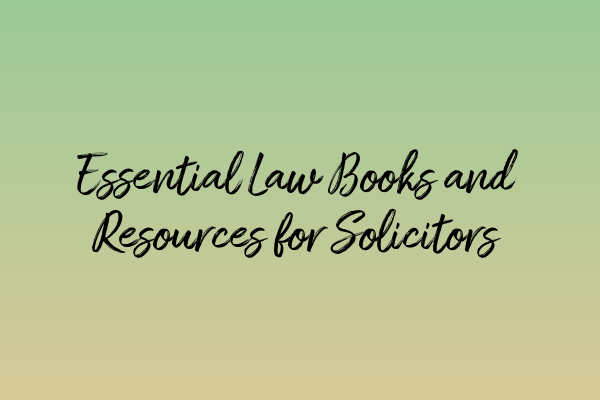Essential Law Books and Resources for Solicitors
As a solicitor, staying updated with the latest legal developments and honing your skills is crucial to providing high-quality legal services. With the vast body of law and the ever-changing landscape, having the right resources at your disposal is essential. In this blog post, we will explore some of the essential law books and resources that every solicitor should have.
1. The Law Society Library: The Law Society Library is an invaluable resource for solicitors. It provides access to a vast collection of legal books, journals, and databases. Whether you’re researching a specific area of law or need guidance on complex legal issues, the Law Society Library is a treasure trove of knowledge. Make sure to take advantage of their online catalog and digital resources.
2. Legal Databases: In today’s digital age, legal databases have become indispensable tools for solicitors. By subscribing to databases such as LexisNexis, Westlaw, or Practical Law, you can access comprehensive legal information, case law, legislation, and commentary. These databases offer advanced search features, making it easier to find the precise information you need. Staying informed about recent case judgments, statutory updates, and legal commentary is vital for providing accurate advice and representation to clients.
3. Statutory Materials: A solid understanding of statutory law is fundamental for any solicitor. Having up-to-date copies of key statutes and regulations relevant to your practice area is essential. Whether it’s the Blackstone’s Criminal Practice, Halsbury’s Laws of England, or the White Book for civil litigators, statutory materials provide comprehensive and authoritative guidance. These resources will help you interpret and apply the law effectively in your cases.
4. Practice Guides and Manuals: Practice guides and manuals are invaluable for solicitors, especially those who are relatively new in the profession. These guides offer practical advice, procedural explanations, and insights into the best practices for various areas of law. Whether you’re looking for guidance on drafting contracts, conducting conveyancing, or navigating family law matters, practice guides provide step-by-step instructions and examples. Some notable practice guides include Butterworths Civil Court Practice, Archbold Criminal Pleading, Evidence and Practice, and the Family Law Protocol.
5. Continuing Professional Development (CPD): As a solicitor, staying up to date with the law is not just a professional obligation but also essential for your career progression. Participating in CPD activities, such as seminars, webinars, and workshops, ensures you stay abreast of recent legal developments. The Law Society, Bar Council, and other legal organizations offer a wide range of CPD courses on various topics. By investing time in continuous learning, you can enhance your knowledge and skills, ultimately benefiting your clients and your professional growth.
Remember, while having access to these resources is crucial, knowing how to effectively use them is equally important. Develop strong research skills, learn to navigate legal databases efficiently, and utilize advanced search features to find the most relevant information quickly.
In conclusion, being a solicitor means staying up to date and having the right resources at your fingertips. The Law Society Library, legal databases, statutory materials, practice guides, and CPD activities are essential tools that every solicitor should utilize. By continuously enhancing your knowledge and skills, you can provide the best legal services to your clients and navigate the complex legal landscape with confidence.
Related Articles:
– Private Prosecutions: Exploring Non-Governmental Prosecutions in Criminal Cases
– Demystifying Criminal Law Procedures: A Step-by-Step Guide
– Rights of the Accused: Protecting Individual Liberties in Criminal Proceedings
– Magistrates’ Court vs Crown Court: Understanding Key Differences
– Protecting Vulnerable Witnesses in Criminal Trials: Best Practices and Legal Safeguards


Leave a Reply